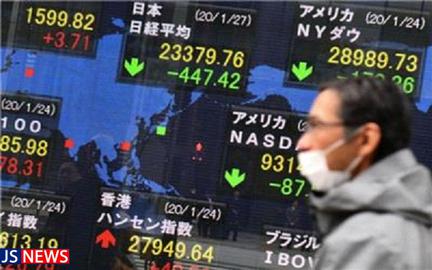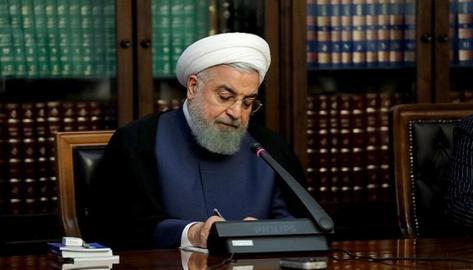The last major global economic crisis of 2009 had many devastating effects on countries around the world, but Iran survived that crisis. Just as Iran's neighbors, especially the southern Persian Gulf states, were grappling with the crisis, sanctions and limited foreign relations became a divine blessing for Iran. Iran's closed political and economic structure prevented it from being impacted by the collapse of US financial markets, and subsequently from the damage done to the western half of the globe.
More than a decade has passed since then. This time, not in the West, but in the eastern half of the world, the risk of China's decreased economic growth threatens the world. Even before the coronavirus disease (COVID-19) outbreak, reputable international institutions such as the International Monetary Fund had predicted that China's economic growth rate would remain below 6 percent up to 2024 (between 5.5 to 5.9 percent). This growth rate is not, of course, low: at the same rate, the economy of a country grows one-third larger in five years. But on the scale of China's economic growth over the last 30 years, this has raised concerns. The extent of the global economy's dependence on China is such that the slowdown in its economic growth affects financial markets around the world.
The outbreak of COVID-19 has increased the risk of a slowdown in China's economic growth, with some forecasts predicting the rate of economic growth in winter 2020 in China following the outbreak of COVID-19 to decrease 2 percent.
The result is not just about China, but the global economy. The Organization for Economic Co-operation and Development (OECD) warned on March 2 that global economic growth could half as a result of the spread of the COVID-19, reaching as low as 1.5 percent in 2020. That is more than half of the IMF's latest forecast for the world economy, and the lowest figure in the last five years and since the global economic downturn in 2009.
COVID-19 has not yet emerged as an epidemic in the West, but it has put pressure on western economies from two angles. One regards concerns and uncertainties about the situation ahead, but more importantly, there is anxiety about the crisis in China and the disruption of corporate activity in Asia as a whole. The sharp reaction of the US financial markets and the decline of the Dow Jones stock market, the biggest fall since the year 2009, is the most tangible sign that the world must prepare for a full-blown global economic crisis, the magnitude and timeframe of which is still unclear.
Will Iran Remain Immune From the Global Economic Crisis this Time, Because of its Isolation?
Certainly not. For some obvious reasons.
1- Iran itself is in the midst of the COVID-19 crisis. Currently, after China, Iran is the second-largest coronavirus center in the world. The exact figures of those affected and the scale of the spread of the virus are not yet known, but so far the number of those infected (officially confirmed) means Iran is in fourth place among the world’s countries, and Iran has the highest death rate from COVID-19 after China.
Therefore, even without a global crisis, the situation in Iran would continue to deteriorate. When the seasonal growth of China's mighty economy of 6 percent drops by about 2 percent, or when the Organization for Economic Cooperation and Development warns of world economic growth halving in 2020, the crisis in Iran's economy is clear.
2- Iran's economic situation is not the same as it was 10 years ago. Over the last two years, Iran's economy has shrunk by about 15 percent, and if the population growth is taken into account, it will shrink to 20 percent in two years' time. Since early 2012, the size of Iran's economy has remained almost constant, while the population has grown by 10 million, and while the global economy has grown by an average of 40 percent during this period.
With such a backlog, Iran certainly has little resilience to deal with a major social crisis — a crisis that can lead to a semi-closed status in the entire economy, as has been seen in recent weeks. As IranWire reported on March 2, it is estimated that the economic loss due to the COVID-19 crisis will be around US$242 million a day at current prices.
3- Despite the most severe economic sanctions, Iran is still dependent on foreign trade, especially with Asian countries, China chief among them. The value of Iran's non-oil exports last year was $44 billion and imports were $42 billion. Iran's oil exports are normally worth between $40 and $50 billion, meaning that Iran's foreign trade volume is between $90 and $100 billion, more than one-fifth of the country's gross domestic product (GDP). This represents the degree of the Iranian economy’s dependence on foreign trade. Thus, with the onset of the economic crisis, especially among Asian countries such as China, there are likely to be serious disruptions in Iran's economy in the range of between 10 and 20 percent.
4- The other reason is that Iran has a special relationship with China. The world economic crisis of 2009 was centered on the US and the West. Even China did not suffer a recession at that time. Also, Iran did not suffer in the previous crisis because of its lack of contact with the Unites States and limited trade relations with the West. This time, however, the center of gravity of the crisis is in China, Iran's biggest customer for its oil, even in the turbulent sanctions situation, and Iran's largest and most important trading partner. Last year, a quarter of Iran's imports and a fifth of Iran's non-oil exports were to China. Therefore, Iran will be much more vulnerable to the global economic crisis than it was in the previous crisis.
***
The occurrence of social and economic crises throughout the world is inevitable. Although the situation in Iran seems more chaotic than in any other country, it is not the only country to suffer from COVID-19 outbreak and its social and economic consequences. The problem is that other countries are preparing to face the crisis in a relatively more stable way, but Iran has been so busy over the last five years dealing with a range of economic, social, and domestic crises (often ones it has created itself) that it has practically no power to deal with this new crisis.
visit the accountability section
In this section of Iran Wire, you can contact the officials and launch your campaign for various problems


























comments